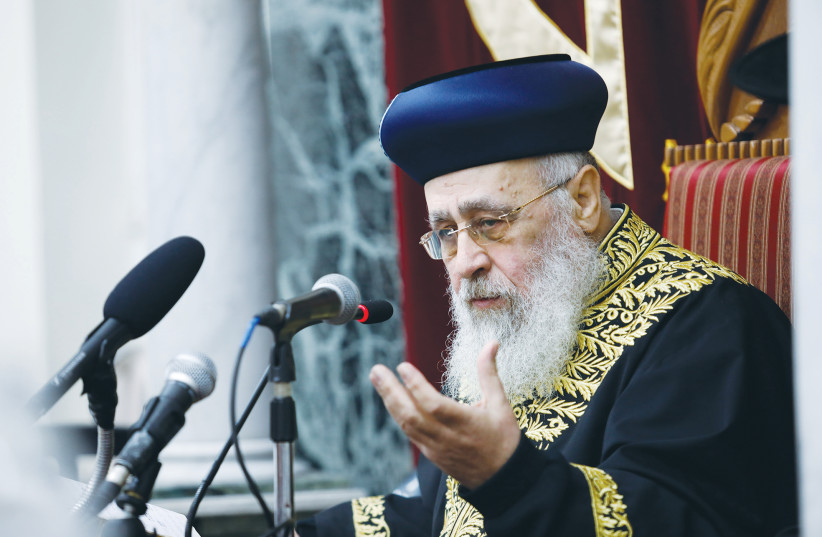The irony of Jewish conversion in Israel - opinion

"They want mass conversion. This won’t happen," Rabbi Yosef said about the deputy religious affairs minister.
At the Conference of European Rabbis in Munich last week, Chief Rabbi Yitzhak Yosef attacked Israel’s government policy on conversion.
“We need to fight them until they repent from their evil ways,” he was quoted as saying.
It is probably worth exploring who paid for Rabbi Yosef’s expenses to travel to the conference and whether it is ethical for the chief rabbi to use his platform and position to attack government policies.
But I would like to focus on another feature of his statement: not whether it is okay to attack the government but whether such attacks are in line with normative halachic Judaism. In my humble opinion, Rabbi Yosef hasn’t only done a disservice to the government he is meant to represent, but he has done something much worse, going against a principle that was articulated by the unqualified leader of European Orthodoxy 100 years ago.
One aspect of Rabbi Yosef’s breach of normative Judaism is his inaccuracies related to those he seeks to discredit. He was quoted as saying “a group of rabbis” has arisen that claims that one can convert without the convert accepting the commandments. There is no such thing. There is no conversion without commandments. I don’t know where these rabbis grew up.
Though I cannot be certain to whom Rabbi Yosef is referring, one can only surmise that he is attacking the Beit Din of ITIM-Giyur K’Halacha. Since I direct this rabbinical court, I can say with confidence that in the more than 1,700 conversions that have happened under its auspices, everyone over the age of bar or bat mitzvah has fully accepted all of the mitzvot. To belittle rabbis with serious halachic credentials, as he was quoted, is to do a serious disservice to Halacha.
Here is what Rabbi Yosef said about the deputy religious affairs minister:
“They brought a pilot. He understands the skies, not Halacha. He is influenced by small rabbis – I don’t even know if they should be called rabbis at all. They want mass conversion. This won’t happen.”
Rabbi Yosef’s belittling of rabbis isn’t only inaccurate. He knows very well that many of these rabbis work for the State of Israel – directly for the rabbinate he supports.
But much more serious than Rabbi Yosef’s misstatements and his spreading of disinformation is his disparaging tone. Over the centuries, there was a serious halachic debate about the efficacy of conversions in which the convert failed to continue to be halachically observant following his or her conversion.
This debate was never resolved in more than 800 years of halachic history. In the last 300 years, authorities in Europe, North Africa, North America and Israel have battled over this issue. Statistics show that even among the rabbinate’s conversions today, many of the converts fail to keep up their commitments to observance.
Which leads me to the irony of Rabbi Yosef’s attack from European soil.
The universally accepted leader of Orthodoxy in Europe 100 years ago, Rabbi Chaim Ozer Grodzinski, ruled that lack of observance in almost all cases would not undermine the efficacy of the conversion. Now it is clear that many Orthodox authorities did not accept his thesis (outlined in his volume of responsa, Achiezer 3:21-23).
But at the end of his painfully honest analysis (where he notes that he changed his mind following the First World War), Rabbi Grodzinski notes that even if rabbis are performing conversions in a manner that isn’t considered acceptable to the majority of rabbis, one should not attack them publicly.
Here is what he writes:
“I find it inappropriate that one should scream about the rabbis of the generation to publicly protest against conversion. For in the eyes of the average person (am haaretz) it would be a desecration of God’s name (hillul Hashem) not to allow women to convert, and particularly children, who in truth according to the law, we can convert.”
Rabbi Grodzinski differentiated between his personal beliefs and public policy. He felt strongly that attacking rabbis who didn’t see things the way he did would be counterproductive and lead to a travesty, especially when the normative Halacha clearly recognized those conversions.
Today, no less than 100 years later, statements that are false, statements that are disparaging against rabbis and statements made that dismiss legitimate halachic opinions are counterproductive. We can debate whether it is okay for the Chief Rabbinate to attack the government; but it doesn’t seem okay when the Chief Rabbinate contradicts hundreds of years of halachic history.
The writer is the founder and director of ITIM and its conversion court, ITIM-Giyur K’Halacha.
Jerusalem Post Store
`; document.getElementById("linkPremium").innerHTML = cont; var divWithLink = document.getElementById("premium-link"); if (divWithLink !== null && divWithLink !== 'undefined') { divWithLink.style.border = "solid 1px #cb0f3e"; divWithLink.style.textAlign = "center"; divWithLink.style.marginBottom = "15px"; divWithLink.style.marginTop = "15px"; divWithLink.style.width = "100%"; divWithLink.style.backgroundColor = "#122952"; divWithLink.style.color = "#ffffff"; divWithLink.style.lineHeight = "1.5"; } } (function (v, i) { });

